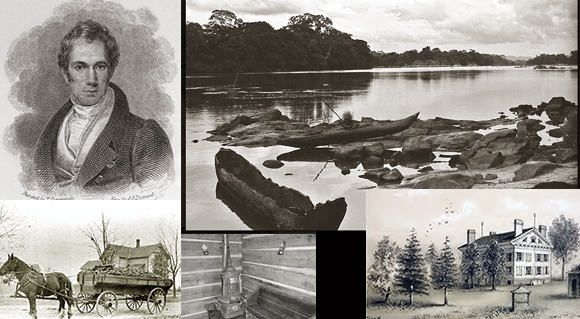During the early part of my apprenticeship, when I must have been about fifteen or sixteen years of age, my boss was preparing his team and wagon to visit a store about two or three miles from home, in order to procure groceries and family supplies, and as I had not much to do at the time, very kindly invited me to accompany him, and I very gladly accepted the invitation.
We rode to a place then called the English Kills or Newtown Landing. About three miles northwesterly from there was another creek or landing, likewise leading to the Sound, called the Dutch Kills, which was possessed by a neighborhood of Low Dutch settlers.
We alighted from the wagon. While he went to transact his business at the store, I strolled to the landing place, some hundred yards down a green bank leading to the water. Here lay several small boats, and among the rest a small log canoe, about one-third full of water.
This happened to take my fancy, and in I jumped with nothing but a small stick for a paddle; I shoved off, perhaps about two yards from the shore, and being totally unacquainted with a boat, or aware of the rotundity of its bottom, I soon lost my balance in her, and over she tipped in the twinkle of an eye.
She was bottom upwards and myself head foremost in the water, which as I recovered my feet was about breast high, and I was completely wet from head to foot. It was about the middle of April and the water was still very chilly, and what to do I did not know, as I was ashamed to go into the store.
As I grew very cold I ventured a short distance, where stood a small house and where hung a sign for a tavern, and in I went. Here was a large stove, and the room was comfortable and warm. Here were several men drinking, etc., and they soon discovered what had happened to me, and set up a hearty laugh, saying I had been “in old Caesar’s eel pot,” so called from its being the property of an aged free black, for fishing purposes, and they had much merriment on the occasion, but told me to set close to the stove and dry myself, which I did and soon felt comfortable.
But how to get along with my boss, was the worst. But soon after, I heard someone calling. I answered, and met him as he was getting into his wagon. As we were riding along, he observed from my clothes something had happened, and I finally related the whole circumstance to him, and he enjoyed the joke at my expense, and observed, “you will long remember your first visit to the Kills;” and this was very true, for I never passed the place on my way back and forth to New York, but I thought of my ducking, etc. And this continued, and afterwards when I resided in the city, on my visits to my father, many a joke have I had with various acquaintances as we rode past.
This continued after I was in business in New York, and as my business prospered, I made up my mind to own the place if it was ever for sale, and I able to purchase it; but this did not happen until the year 1815, when it was advertised for sale, and I was the owner three days later.
While that seemed the consummation of all my wishes at this period of my life, and I had been industrious and frugal, in order to be able to own this place above all others; and I made my arrangements to remove to it immediately and reside there, while still continuing my business in the city with the same avidity that I had before. In the meantime, not relishing the name of English Kills, I found from the records of some old Indian title, that the Indian name of this place was Maspeth, which I immediately adopted.
Some years after, I had been fishing down the creek, and had taken a little son with me, a boy about five or six years of age. On our return, the tide had not risen sufficient for the boat to float into the boathouse. I left her and took a seat in the shade, a few paces from her, leaving the boy to his own amusement. I had left but a few moments when I heard a splash in the water, and the boy cried out, “Papa, I’m in.” I sprung on my feet. Where he was in the water was about one foot deep. “Papa, what shall I do?” I could but laugh, saying, “lay still.” He hesitated a few seconds, and gave me a confused look, saying, “no, I won’t.”
A moment’s recollection brought to my mind that it was within six feet from the spot where I pitched from old Caesar’s log canoe. And thus it appears that this vicinity has had its incidents as many other places.
Here, by the Herculean mind of DeWitt Clinton, was planned for maturing the stupendous undertaking of uniting the waters of Erie with the ocean. Here was the home of the boyhood of Dr. Valentine Mott, one of the most distinguished surgeons and mediciners of the age. Here the present proprietor has a beautiful collection of natural history and other curiosities, and a very few old books, etc. And here probably the humble author of the Maspeth Poems will hang his harp on the willows planted by his own hands.
The Maspeth Poems:
Rural Hours – Autumn
by Garrit Furman, 1837
Now Autumn comes with mild effulgent ray,
To rule alone along the less’ning day;
While Summer, soft retiring, glides along,
And mellow tints the forests play among,
All nature doth in varied robes appear,
And comes again to crown the sinking year;
Then spreads around, with rich, profusive hand,
Her choicest gifts throughout the smiling land.
Come then, oh muse! Awhile with me explore
Where rustling fields set forth their golden store,
And see the ripening orchard bright expand
Beneath the season’s consummating hand;
While industry rejoicing smiles around,
And useful labor too by heaven is crowned.
Now dimly shines with sickly face the sun,
Slow verging from the smoky horizon;
And chilling mists along the morning ride,
When light and darkness equal reign divide;
And vapory clouds condensing thick and drear,
Then comes the equinox in wild career;
Wide o’er the trembling world the tempest roars,
Then from on high the watery deluge pours,
And sweeps the fertile valley far and wide –
Engulphed amid a desolating tide!



